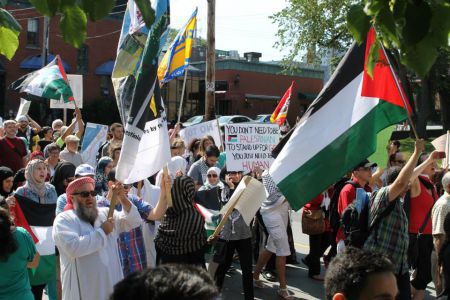K'JIPUKTUK (HALIFAX) – Students in Halifax made headlines this past summer through several protests against the violence in Ferguson, M.O., and Israel’s attacks on Gaza. These student-organized events not only garnered the attention of local media, but helped bring home the impact of world events to our community, begging the question: what impact does local activism have on a global scale?
Dr. Robert Huish is an international development studies professor who teaches an activism class at Dalhousie University, and believes well-organized student activism has the potential to make world change.
“Halifax being a small city has nothing to do with the impact that activism can have on a society,” he said in a recent interview, citing that Montgomery, Alabama., was a small town, and yet was pivotal in the U.S. civil rights movement. “Activism can take shape anywhere as long as there are well-organized and committed individuals at the helm, and it can inspire action on a global scale.”
Several years ago, Huish assigned students to read Escape From Camp 14 —the chilling biography of Shin Dong-Hyuk, a prisoner who escaped from a North Korean labor camp, and used his story to expose the atrocities committed to the Western world. Students went on to create the Camp 14 Project — a movement encouraging Canadians to take more action against human rights violations — which received recognition from the federal government.
“When letters come in from the Prime Minister’s Office and from the Minister of Foreign Affairs seeking the input of students on foreign policy issues, you know you’re on to something,” Huish said of the students efforts.
“Universities have had a long-standing role (in organizing social change) ... today that potential continues, as students are passionate, eager, and deeply interested in pursuing betterment in this world,” he said.
Amer Hussein is one those students striving to make social change. Hussein, a Palestinian student, founded the group Students Against Israeli Apartheid at Dalhousie, in hopes of creating more awareness around the injustices experienced by the Palestinian people under the Israeli occupation. Besides several protests and pickets over the summer, the group is currently working to launch a boycott, divestment and sanctions campaign, which will pressure Dalhousie to pull its investments from companies that have ties to Israel.
“Instead of funding countries and armies to carry out aggression and injustices, that money can be used in the community instead,” Hussein explained.
“If actual change can happen it’s going to begin with our communities. Our communities (are) where everything starts.”
Recently, the group, along with Solidarity Halifax and other local activists, rallied in front of Halifax MP Megan Leslie’s office, calling for the NDP to condemn Israel’s war crimes and criticize the Harper government’s indifference towards to use of collective punishment. This led Leslie to release a public statement, in which she agreed to meet with protesters.
This is an example of targeted activism —where specific demands are made and achieved during a protest— and is what Huish calls one of the most effective forms of activism.
“The thing to consider is what is the end goal of the demonstrations? To challenge government? To stand in solidarity? To educate other members of society? Students can have large impacts through activism as long as they are prepared to go the distance,” he said.
Indeed, when Dalhousie student Ntombi Nikwane co-organized a march to support the people of Ferguson, M.O, following the police shooting of 17-year-old Mike Brown, her goal was education. She wanted people to draw connections between the radicalized violence in America to the long-standing injustices experienced by Nova Scotia’s black community.
“Halifax isn’t exempt from racism and racial discrimination,” she said. “It’s important for the community to understand that Canada has had a long history of racial discrimination.”
The protest had a turnout of nearly 600 people, which Nikwane hopes will lead to future activism around enduring social issues in the black community, such as poverty, housing and the disproportionate incarceration of black youth.
“We wanted to get people to realize that if we don’t mobilize then these issues will continue to happen. It takes patience and it takes education, but once you get people to realize that these things are affecting people here and their friends of colour, then they start to realize it’s important to take action,” she said.



